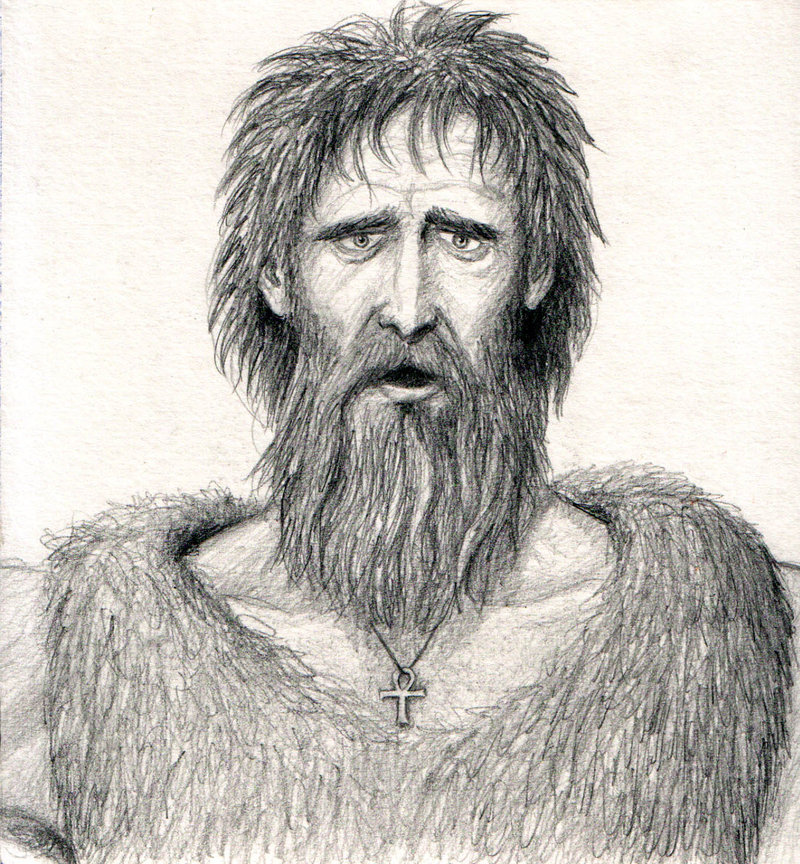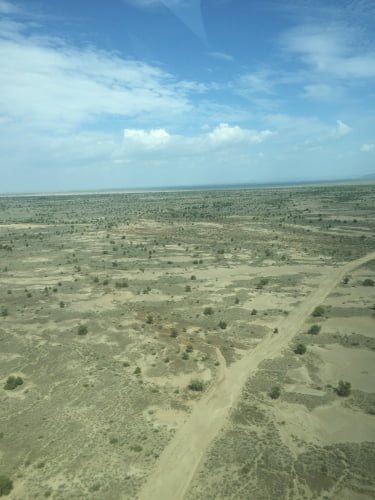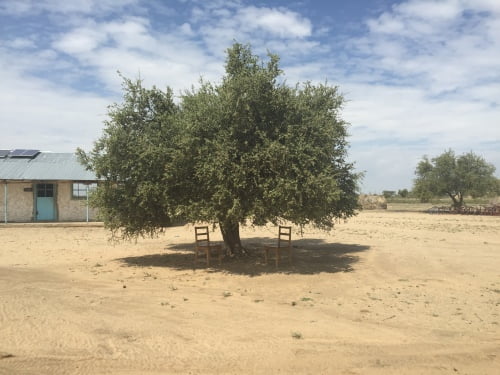A sermon preached at The Federated Church, Weatherford, OK . . . Mark 1:1-8
Our lives get really busy this time of year, don’t they?
Parties to attend. Presents to buy. Family celebrations to prepare for . . .
Even look at the back of the bulletin this morning and you’ll see a list long of upcoming activities, more than usual around here.
But over the next couple of Sundays in Advent that you’ll hear my voice from the pulpit, we’re going to be talking about what it means to find space in our lives We’re going to talk about what it means to spend our time in ways that bring us closer to that One we are waiting for. And we’re going to practice making room for more of the Christ child to be born in us.
I hope that worship can SLOW us all down a little.
Not just in clique ways that could be summed up by the popular statements like: “Jesus is the reason for the season” or “Don’t take Christ out of Christmas” but truly opening our lives for more of the Son of God, God with Us to come in.
As we look at our lections for today, Mark’s gospel opens by declaring the fulfillment of a prophecy text from Isaiah 40:
“It is written in Isaiah the prophet, ‘I will send my messenger ahead of you, who will prepare your way, a voice calling out in the desert, prepare the way of the Lord.”
 And this messenger’s name is John. Or more properly known as John the Baptist.
And this messenger’s name is John. Or more properly known as John the Baptist.
John was the messenger of preparation—the greatest opening act that there ever was, telling the people who gathered around him in the desert that something really good was coming and they needed to make room in their lives to receive it.
John was an unlikely opening act. We learn a few things about him in Mark 1, verse 6. He lived in the desert. He wore clothing made out of camel’s hair. He wore a leather belt around this waist. His diet consisted of wild locust and honey. What a description!
John the Baptist was man who was of the land, who lived off the land, and who had a simple message: a baptism of repentance for the forgiveness of sins.
And though we hear a version of John’s story read every Advent, it’s one, I think, that all of us have a hard time relating too, given our place in history and geography. For we don’t live in remote desert and John simply sounds like a deranged character we’re not sure that we’d ever want to meet.
But might there be something the setting of this one preparing the way, that might tell us something about what making room for Jesus is all about?
I think it is no coincidence that John asks the people to repent and be baptized in the desert.
The desert is a lonely place.
The desert is a quiet place.
The desert is a place with few distractions.
The desert gives our hearts space that they don't otherwise have . . .
And throughout the centuries, it has been the place where spiritual seekers have gone to find God.
And it just so happened that this week I spent time in the desert of Northern Kenya, in the county of Turkana that isn’t too far from Sudan. I wasn’t on a spiritual pilgrimage but Kevin and I along with several members of our staff in Kenya traveled to visit programs through Feed the Children.
It began like this: we took a small charter plane to an airstrip in the middle of the true definition of “no where” to then take a van on an hour drive to the  community of the Turkana people.
community of the Turkana people.
As we traveled the dusty roads with barren trees and goats and wild camels roaming around, the feeling of starkness was overwhelming. Wide-open spaces with few people and homes made out of tree limbs and covered with animal skins filled our vision.
There were no stores. There were no street signs. There were few cars, if only just ours for miles and miles.
The thick heat of the desert warmed our van, even with the air conditioning blasting. I told Kevin we’d better put thick layers of sunscreen on if we didn’t want to be complete toast by the end of the day.
It was like being in the pages of National Geographic as our van pulled up to the school where Feed the Children donors recently built a multifaceted water aquifer powered by solar panels (so that the Turkana people didn’t have to walk over 10 miles one way to the nearest water source).
Women dressed in brightly colored wraps with multicolored necklaces around their elongated necks greeted us with dancing and song. The male elders of the community soon took Kevin by the hand and made him an honorary chief completely with a staff, stool to sit on and a hat made of ostrich feathers. Children followed us around in torn clothing and flip-flops made of old tires on their feet.
And though we could have easily judged this way of life as backward or disorganized or even said to ourselves, “How could these parents allow their children to grow up like this?” upon deeper observation we saw there was a bigger picture of what life is like in the desert.
Life, you see, in the desert looks clear in ways that it doesn’t in the hustle and bustle of city and town life. We can’t hide behind gadgets. We can’t pretend that we can go it alone. We can’t waste anything that could be used for the common good.
In the case of Turkana, we learned that the desert gave those we met rhythms that governed their life together including respect for the land and thanksgiving for life’s most important blessings: food, water and education for their children. And most of all, in the remote location, they knew they needed each other. They belonged together and organized themselves accordingly. There was great clarity in who they were and what they were about.
And, being in the actual desert this week convicted me of many things—
And for all of us, we have a lot to learn from the desert and those who dwell there.
But what if you never live or visit a place like this? It doesn't matter. Deserts can be anywhere. We can all slip away from time to time into spaces—even if they are just mental places where our phones are turned off and our minds are at rest.
This is what I know: you and I are never going to be ready to meet the Christ child this Christmas if we aren’t willing to alter the practices of our lives, to go to places of solitude where we can hear the God, where we can remember what really matters in life and can turn away from what keeps us from having room for Jesus.
Catherine de Hueck Doherty, a Christian teacher and activist wrote while serving amongst the poor in Canada in the 1960s this about making room for God saying that solitude is not about the fantasy of a cute little cabin in the woods or spending a week chanting with monks.
No, I think Catherine would propose that we could find “deserts” right here in Weatherford, OK (or wherever we live).
Catherine writes: “One of the first steps toward solitude is a departure. Were you to depart to a real desert, you might take a plane a train or car to get there. But we’re blind to the “little departures that fill our days. These “little solitudes” are often right behind a door which we can open, or in a little corner where we can stop."
Catherine goes on say what these desert moments can be saying: “Consider the solitude that greets you when you enter your room to change your working clothes to more comfortable ones . . . Consider the solitude of housewife, alone in her kitchen, sitting down for a cup of coffee before beginning the work of the day.”
I would add the solitude of the moment you first open your eyes in the morning.
Or the solitude of brushing your teeth after showering.
Or the solitude of driving to work in the morning, without the radio on.
These are all places where we don’t have to do anything different from we otherwise would, but moments when we can be aware then, stop and know who is God.
Because I believe, just as John the Baptist taught us that real life re-alignment does not take place in the fast paced, over crowd space that you and I live in. Especially in a season like Christmas where everybody wants us to be somewhere doing something that seems really important at the time.
No, God leads us to spiritual deserts.
So, I want to tell you this, if we want to make room for Jesus this Christmas, you and I are going to have to stop, we’re going to not let the moments of “desert” that find us pass us by.
And if you’ve been trying to live the Christian life for any time, I bet you know what I mean when I say pay attention to the still small voice that speaks to us saying, “This is my path walk in it” or “Come away with me, my Beloved."
 For this is what making room for Jesus is all about. For when we make room in our days to be present—I believe, and then the Holy One also becomes present to us. Not because the Holy has ever gone anywhere or left us, but these are the times we have the capacity to listen!
For this is what making room for Jesus is all about. For when we make room in our days to be present—I believe, and then the Holy One also becomes present to us. Not because the Holy has ever gone anywhere or left us, but these are the times we have the capacity to listen!
And let me say this--- we live in a culture where practices of mediation, yoga and silent retreats are all the rage. And they are great practices with great health and mental benefits. But we can’t stop here.
Going to the desert, finding solitude means nothing unless we aren’t led as John the Baptist was--- to the One whose sandals he was unworthy to untie.
For it’s the ultimate calling of Advent—to make room for Christ.
He's the light that can make the most unhappy of us this Advent open our heart to believe again.
He's the light that can break through the coldest of hearts, the most horrid of circumstances to hope again.
He's the light that can touch our souls in expressions beyond words to know that peace that passes all understanding.
So this morning, Calling all dreamers . . . calling all wanderers . . . calling all grieving friends who think you can't possibly live through another Christmas . . . calling all those who want a life different from you see right in front of you right now. The good news has come. And it is in the desert.
Come, and receive what you are most longing for this Advent: a deep abiding peace. Darkness will be over soon. And, peace will reign in our hearts.
AMEN